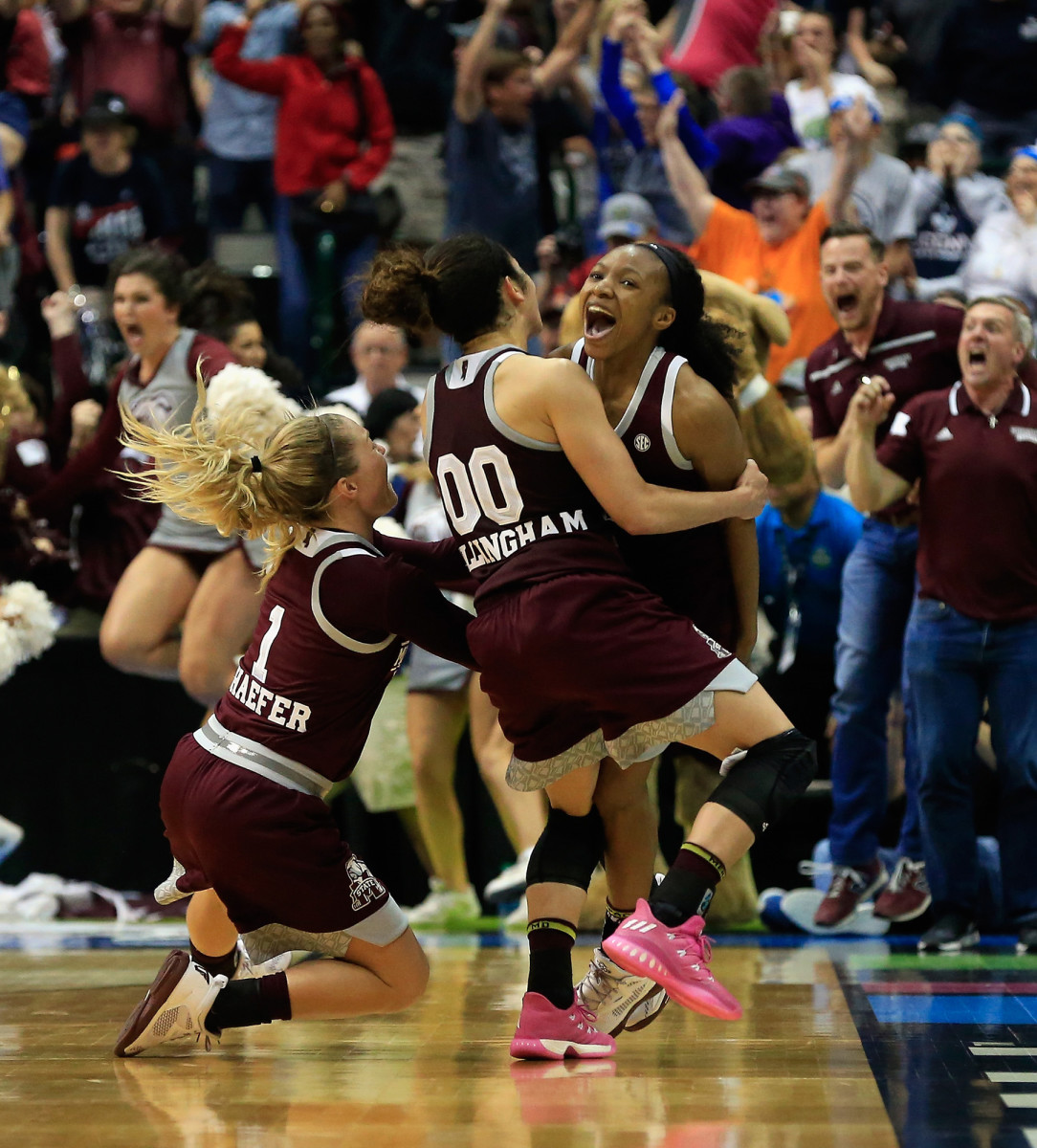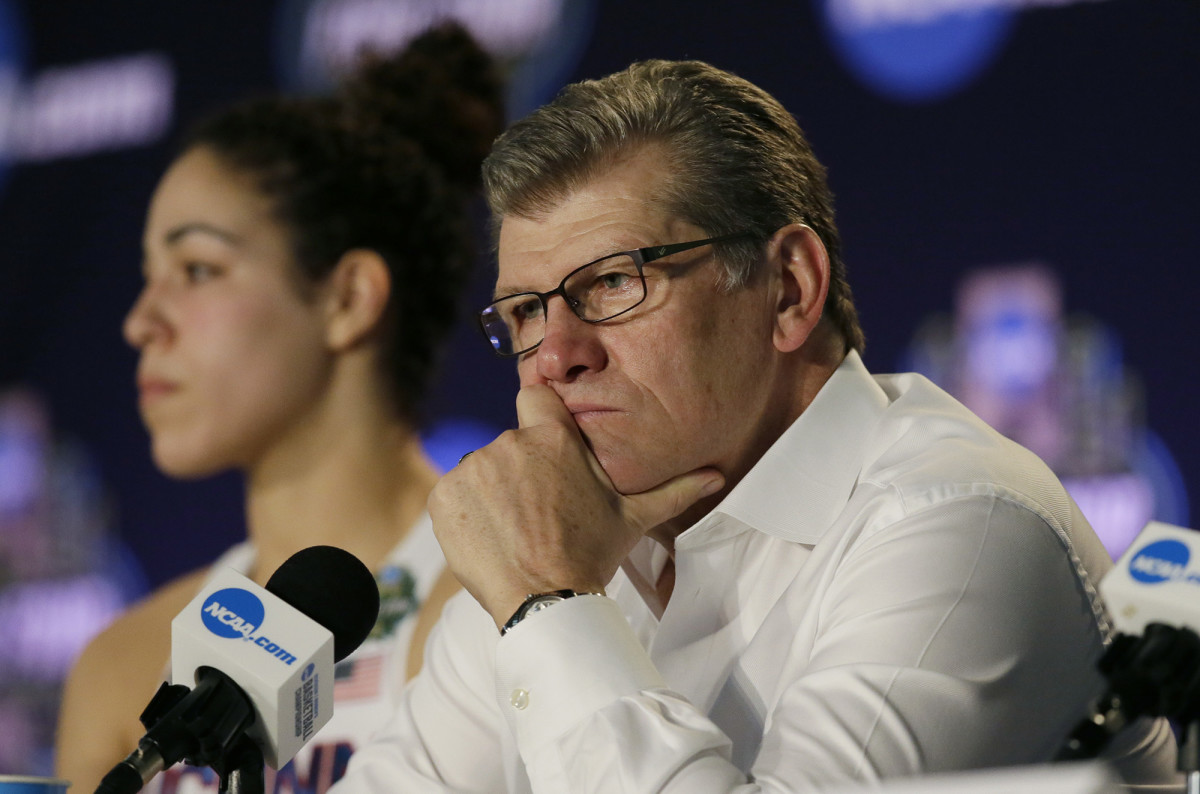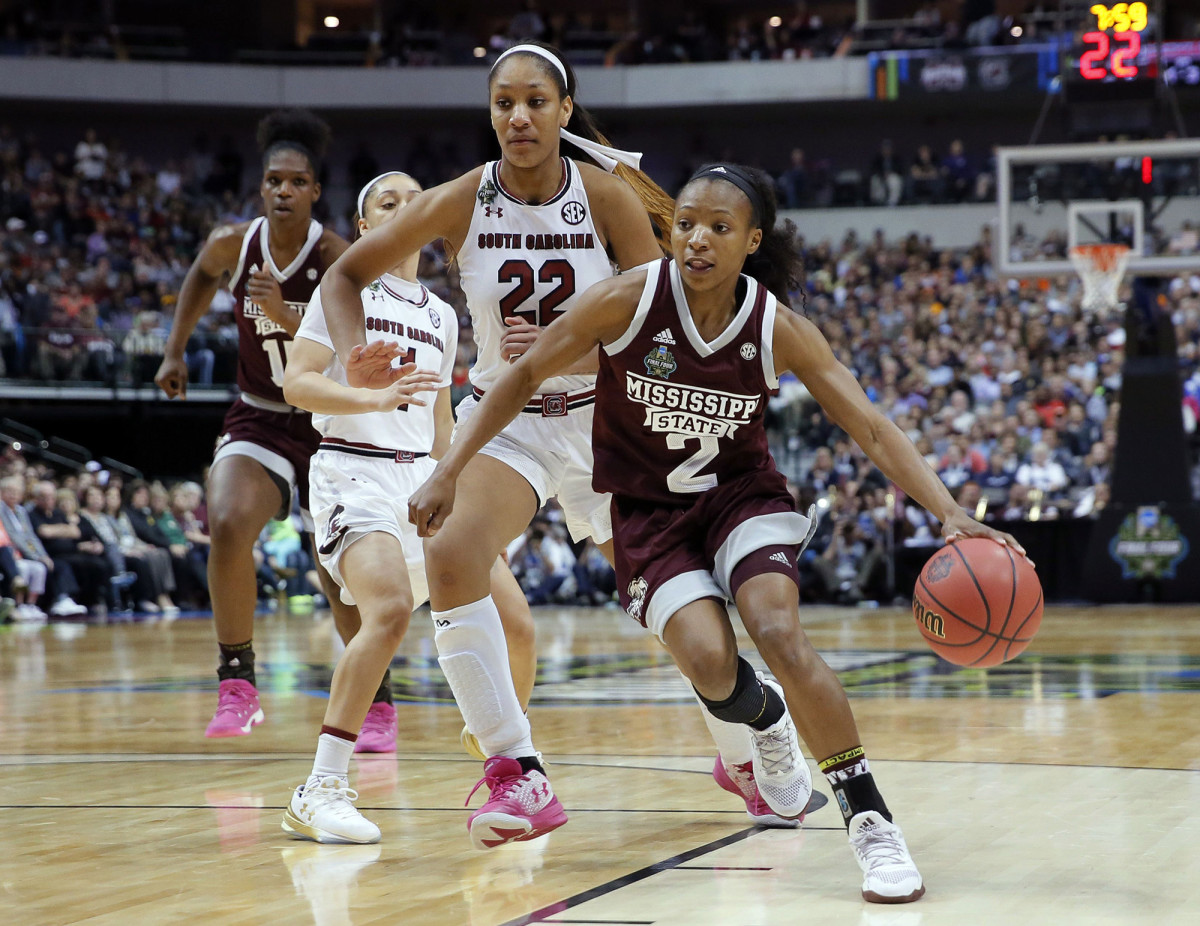Morgan William's Giant-Killing Shot Is Still Shaking Up Women's Basketball

This story appears in the Nov. 6, 2017, issue of Sports Illustrated. Subscribe to the magazine here.
Everyone was supposed to share something unique. This was the first day of Principles of Managerial Accounting, in Mississippi State's McCool Hall, and to break the ice the professor asked each student, in alphabetical order by surname, to tell the class one such fact. Most were what you'd expect: One student had transferred from South Carolina; another had double-jointed elbows. Morgan William, a senior guard on the women's basketball team, fretted as she awaited her turn, then settled on some anatomical trivia: Though she stands 5'3", her wingspan is 5'11".
"Don't you have another unique fact?" the professor asked.
"I can't think of one," William said.
The professor smirked. "I think," she said, "the whole world can think of one."
This is her life now. She used to be Morgan William, short and shy and unknown to most. Now she's Morgan William, Itty Bitty, and known to everybody. That's what happens when you hijack an NCAA tournament by putting on the best and most heartwrenching performance of your career one weekend and then nailing the buzzer-beating dagger to vanquish your sport's Goliath the next.
Women's College Hoops Preview: Top 10, All-America Team and Geno Auriemma Q&A
William's world started to change on March 26, at an Elite Eight game in Oklahoma City. Her second-seeded Bulldogs were matched against the region's No. 1 seed, Baylor, but William was facing a more personal challenge: the three-year anniversary of the death of her stepfather, Donnie Rory, was the day before. She dedicated the game to his memory then spent four quarters telling his voice in her head to knock off the instruction so she could just play. She scored 41 points, a career high, and carried the Bulldogs to a 94--85 upset in overtime that propelled them to the first Final Four in school history. In a postgame TV interview she could hardly push words through her sobbing. "That was for him," she said, wiping her eyes with her jersey. "It's just for him."
Five days later, on a Friday night in Dallas, came the Shot. The national semifinal was supposed to be consecutive win No. 112 in UConn's 2½-year streak, an appetizer before the Huskies clinched a fifth consecutive national title. There were more debates about whether their dominance hurt the sport than whether the streak would end against a team they had beaten by 60 in the Sweet 16 the previous March. But the Bulldogs had been staring at that ugly number—60—scrawled in dry-erase marker on the windows of their trainer's office for a year. They took the court in Dallas unafraid.

Alternating runs led to an unexpected overtime, which ended in an even more unexpected finish. With the score tied at 64 and four seconds to play, William called for the ball from the edge of the Final Four logo at midcourt, caught a pass from 5'9" guard Dominique Dillingham, took three quick dribbles to the right elbow, and pulled up for a twisting, slightly off-kilter jumper over the outstretched arm of 5'11" All-America forward Gabby Williams. The buzzer sounded. The shot swished. The arena erupted.
A fairy tale might have ended there. But the real world guarantees no storybook endings, just new paragraphs in never-ending stories. Two days later, with William sitting on the bench for the entire fourth quarter (more on that later), MSU lost the title game to South Carolina. And so perhaps the wildest weekend in women's Final Four history ended with its team of destiny at home, the weekend's hero dejected, and a new school's joining the sport's short list of champions. Seven months later, three teams start a new season in an unfamiliar position; a single splash through a net in Dallas is still causing ripples.
In coach Vic Schaefer's office, there is a 12×16 print of white circles and squiggles on a maroon background mounted above a thermostat and a gumball machine. It's a minimalist diagram—entitled SNAPPED—of the play that resulted in William's game winner, made by a website called Printstant Replays. Schaefer signed five of these prints for a Make-A-Wish fund-raiser, so the site's owner gave him one free. "I wanted it right there," the 56-year-old Schaefer says, admiring the print. "It's hard to miss."
The room is littered with trophies and keepsakes from Schaefer's five years with the Bulldogs. Such a display would have been unimaginable during his first season in Starkville (after nine as a Texas A&M assistant)—in January 2013, Mississippi State lost three straight SEC games by a total of 121 points. Around that time, Schaefer was courting a pipsqueak point guard from Birmingham, whom he hoped would help power his program's turnaround. Despite a prolific career at Shades Valley High, William was lightly recruited. Coaches would tell her, "You're a little short—I'll keep in contact." Often only one of those statements was true.
But Schaefer saw a speedy, fearless, long-armed defender who could cover the floor in his relentless full-court pressure scheme. Once on campus, William roomed with Schaefer's daughter, Blair, also a guard, and she frequently came to dinner at her coach's house. "I love her like a daughter," Schaefer says. When he talks about her shot against UConn, he beams like he can still hardly believe it.
Which is why he's so bothered by the idea that he benched her for the final eight minutes of the national championship loss to South Carolina. "Morgan was not benched," Schaefer says. "She's never been benched." Instead, Schaefer says, a struggling William was merely replaced by then sophomore guard Jazzmun Holmes, who had fresher legs and at 5'8" could more easily feed the Bulldogs' post attack. Once Holmes proved more effective, he kept her on the floor, just as he had done for much of his team's second-round win over DePaul. Thus William, on two nights of fitful sleep after playing 44 of the hardest minutes of her life, was left spectating. "Bless her heart, she was doing the best she could," Schaefer says. "But at the end of the day, she looked tired."
These explanations have done little to quell inquiries around Starkville—still, nearly seven months later—about just what happened that night in Dallas. Such is the scrutiny suffered by the runner-up. "I can't tell you how many people say, 'Hey Coach, great year, just need to win that last one,'" Schaefer says. "I'm like, 'Yeah, we did win 34 games, I'd like to win the last one too.' But it's hard to do. It's really hard to do."
No coach in hoops history has won the last one more times than Geno Auriemma's 11. Until last April, they had not ended their season in defeat in five years. And so when Auriemma is asked the difference between entering a season after a championship and entering a season after not winning one, he smiles. "I don't know," he says. "It's been a while."
What Auriemma does know, from having coached six undefeated teams, is what perfection looks like. What he saw in 2016-17 was anything but. There were questions in his mind about the maturity of his roster, which had one senior. Doubts crept up whenever his players failed to master yet another drill in practice. Even as his Huskies kept extending the program's win streak that began in November 2014—to 80 games, to 90, to 100—Auriemma expressed concerns about the cracks so few seemed to notice. "No matter how much I said it, people said, 'Ah, you're crazy,'" Auriemma says. "I wasn't crazy. It's a miracle that we kept it from happening for so long."

In the semifinal against Mississippi State, he felt a breaking point coming. During a timeout after the Bulldogs opened a 29-13 lead, Auriemma told his huddling team to "just throw it to Stewie"—forward Breanna Stewart, who had graduated a year before. His point: There would be no three-time national player of the year to bail them out. They would have to mount a comeback themselves.
They did, tying the game by the end of the third quarter and forcing overtime when forward Gabby Williams blocked Morgan William's driving layup. But in the extra period the Huskies missed more free throws (two) and had more turnovers (three) than they made field goals (one). In the final seconds, as Auriemma watched William—who reminded him of UConn heroes Kemba Walker and Shabazz Napier—sink her final shot, he couldn't help but smile.
It's a reaction he's been asked about a lot. His first thought, he says, was about the volume of the crowd's cheers, a recognition of how great a moment it was for the sport. Later that night, there was something else too. "Once you get past the disappointment, you start to look at it as: We really needed this more than we needed that win," he says. "Because this is something that regenerates us."
Just one senior graduated from last year's UConn team. The Huskies have three All-Americas back (chart, below)—forwards Williams and Napheesa Collier and wing Katie Lou Samuelson—and add six new players, including versatile 6'6" Duke transfer Azurá Stevens, an All-ACC first-teamer. It's a team more talented than last year's near-perfect one, liberated by William's jumper from the yoke of maintaining their predecessors' record. "None of that exists right now," says Auriemma. "We're like everybody else—except South Carolina. And I think that's good."
Dawn Staley was seated with her South Carolina coaching staff on press row during the UConn--Mississippi State semifinal, scouting their eventual title-game opponent. She was rooting for the Bulldogs—not to duck the Huskies, to whom the Gamecocks had lost by 11 in Storrs in February, but for the prospect of an all-SEC final. In truth, she doesn't think the opponent would have mattered. "We just had it going on," Staley says now. "We were destined to win. It was our year. Regardless."
The title, Staley says, "was just a monkey off my back." She had grown up in North Philadelphia with two goals: an NCAA championship and Olympic gold. She reached three Final Fours and the 1991 title game as an All-America point guard at Virginia, but her Cavaliers never won it all. She did, however, win gold—in '96, 2000 and '04.

So when the NCAA title came—with Staley as the Gamecocks' coach—what did it matter whom it happened to come against, what monumental shot might have brought them there? What mattered was the way senior Allisha Gray set the tone, the way junior A'ja Wilson dominated inside down the stretch. What mattered was that Staley had fulfilled a promise to Carolyn Peck, who had given her a snippet of the net she had cut down with Purdue in 1999, when she became the first African-American woman to coach a national champion, and told Staley to pay it forward when she became the second. What mattered was the goal Staley finally fulfilled.
Before the trophy could even be presented she grabbed it and paraded around the court, beaming. "I wanted to feel and touch it, to make it real," she says. She draped the cut-down net around her neck and dubbed it her "netlace," wearing it so often over the following weeks—around campus, to speaking engagements, to Darlington Raceway—that when she finally took it off she was hassled about where it went.
The national championship trophy now rests in a case in the Gamecocks' offices, a reminder of what the team caught and is chasing again. "We see it as a lonely piece of hardware," Staley says. With the return of Wilson, the projected No. 1 pick in next spring's WNBA draft, Staley is embarking on a quest to get that trophy a partner.
"Everybody's gonna be coming after us," Staley says. "Everybody wants to beat the champions. So you have to give the players a little dose of having to simulate some of that."
The netlace, meanwhile, dangles from the rear-view mirror of Staley's 2018 Yukon Denali. She jokes it may one day help her get out of a ticket. Regardless of what future use it might have, whenever she looks back, there it is.
Fresh off a mid-September workout, Morgan William sits in one of those sterile, heavily branded college athletics conference rooms, alternately flexing her right knee and picking the polish off her thumbnails. It's two months before the start of her senior season, some five months since Dallas. She says she has not changed since that weekend, except "I used to be my lonesome self," she says. "Some days everybody wants a piece of Mo."
In April, in her first few weeks back at school, she was overwhelmed. She rarely left her off-campus apartment except to go to class. Even then that meant a gantlet of selfie requests and handshakes and excited strangers asking if she really was her. She would ask Blair to scope out the crowd at restaurants before deciding if she would join her. At Applebee's, a woman asked her to FaceTime birthday wishes to her granddaughter, so now Applebee's is off limits, as is Walmart, where she felt employees' eyes were tracking her grocery shopping. During a dinner in Birmingham, a fellow diner slipped her waitress a note explaining she was serving one of the best guards in the country. He added, underlined, the word seriously.
Friends call her a celebrity. She bristles. But she does not downplay the significance of her shining moment. "A game-winner on Connecticut, in the Final Four?" she says, eyebrows raised. "That's pretty dope if you ask me. I mean... " She trails off and sighs. "Thinking about it, I'm just like, Wow. Then I'm like: I got one more year in college. I might look at it a decade from now, when I'm in my 30s and have some kids."
Which means, yes, aside from some incidental views on social media, she has not re-watched the shot. But even when well-wishers are not accosting her, reminders are frequent. It's brought up whenever she misses a similar elbow jumper in practice; it's featured on SHOT HEARD 'ROUND THE WORLD posters through the team's offices; soon it will hang as a mural above the team's practice floor.
The aftermath of the shot is mostly a blur to William. She cannot recall the details of her conversation with Bulldogs alum and Cowboys QB Dak Prescott and ESPN's Holly Rowe, nor Blair's insistence that her late stepfather saw it and was proud. The wake of the title game is its own series of images: falling confetti, distraught seniors, reporters descending to the locker room with questions she didn't want to answer, or couldn't.
But that is the past. She will allow the occasional retrospective "wow" regarding her shot but little more. Not that she is looking ahead either. "I don't like to talk about the future," William says. "It never goes as planned." She knows South Carolina lurks at least twice this season, and that if things do go as planned, perhaps a rematch with UConn does too.
For now, William wants to stay present, hard as that may be, given the over-eager well-wishers and billboard-sized reminders and her hunger to return to where the shot brought her. She knows the only way to get there again is to be on the practice floor, a place where no shot counts more than the one before.
